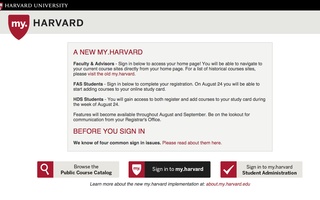Anyone who has logged onto the website of the Undergraduate Council (UC) recently—perhaps hoping to languish away an afternoon filling out grant applications or reading news (“Record Crowd Attends Springfest”) from 2004—understands that it fails miserably at its most rudimentary purpose: functionality. Besides stale grant applications, the site’s voting system has proven difficult to configure in the past, and individuals still have access to the system who have long since departed Sever 113.
Because of these drawbacks, the website is sorely in need of a redesign and a redefinition. The UC’s budget this year originally attempted to address this concern by earmarking $15,000 for website redevelopment. This extremely large set-aside, later withdrawn, demonstrates two things. First, the UC is clearly serious about revamping its website. And, second, the council likely has an inflated vision of what its constituency actually needs from the website.
Two of the more oft-cited goals of a reengineered UC website include a centralized and streamlined room reservation system and an all-College events calendar. These goals are either too daunting or too redundant to justify the effort and funding the UC would have to expend.
The goal of centralizing the competing fiefdoms of control that render the process of reserving a room for an event completely intractable is, quite simply, a pipe dream. Too many different offices have control over room reservations, and the task of conceiving, lobbying for, and implementing a system is too great for such an initiative to approach short-term plausibility. Between individual Houses’ demands that their residents have first choice of rooms and the arcane regulations common among other Harvard common spaces, a centralized room reservation system is nothing but a black hole for time and effort. It would be much wiser, and simpler, to centralize the contact information for rooms in given places in a .pdf file easily accessible on the UC’s website.
As for an events calendar, one is already in the works under the auspices of the my.harvard team, a team that has already built the technological infrastructure for such an undertaking. The UC should leave this project to my.harvard, the platform that was designed to serve as the all-College homepage. The UC’s website is not and should not be envisioned as a type of all-College portal. Instead, the website should function as an efficient and uncomplicated instrument of outreach for the UC’s most mission-critical tasks. Anything more would be excessive and go largely unused. Toward this goal, an improved and functional UC webpage merely requires an improved voting system, simplified and easier-to-use grant pages, a purge of dead links, and maybe even individual homepages where one can find out the interests and current projects of one’s UC representative.
The UC rightly backed out of setting aside $15,000 for an updated website. Looking forward, the UC might be able to get a perfectly functional website on the cheap by tapping into the resources that Harvard students, its constituency, provide. It could be as simple as a website design contest, open to undergraduates, with the UC outlining its needs and wants and offering a $500 first prize to the best design. Following this path, the UC could have said website in hand before they even contract a professional. That said, professional or amateur, whoever the UC hires should be carefully chosen. The last thing the council needs is a repeat of the last UC website update process.
Ultimately, the goal is for the UC to produce a coherent and targeted website that communicates with students in the most efficient way possible. There are many means to this worthy end, and it is indisputable that the UC is committed to working towards this goal. However, to succeed the UC must narrow its vision and look to spend far less than the $15,000 originally proposed.
Read more in Opinion
Shades of GreyRecommended Articles
-
Simultaneous Searches Across the NationBrown University is searching for a replacement for President E. Gordon Gee using a 17-person committee comprised of trustees and
-
Billing Office Moves to Web-Based Term BillsOverdue library books. Another new ID card. A Harvard parking ticket. Until a week ago, students had to trek to
-
Website Bill Dropped as UC Passes BudgetThe Undergraduate Council (UC) unanimously passed its largest annual fiscal budget in history last night—totalling just less than $409,000—after a
-
Now UC It, Now You Don’tAs campaigning for Undergraduate Council (UC) presidential and vice-presidential races has started to gain momentum, each ticket is frantically and
-
 New HUDS Website Is Ridiculously Better Than My.Harvard
New HUDS Website Is Ridiculously Better Than My.Harvard













